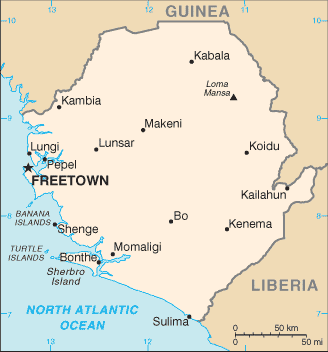Sierra Leone

The Republic of Sierra Leone has an estimated population of 5.7 million (UN, 2010). The capital is Freetown. Sierra Leone has an area of 71,740 sq km (27,699 sq miles). The main languages are English, Krio (Creole language derived from English), and a range of other Africans languages.
Sierra Leone became independent in 1961 from Britain and is slowly recovering from a decade of civil war during 1991 to 2002. The conflict in Sierra Leone killed tens of thousands and more than 2 million people were displaced. In 2002, the conflict ended. Sierra Leone relies heavily on foreign aid to sustain its economy; much of the infrastructure of the country was destroyed during the civil war.
The constitution of Sierra Leone grants equal rights to men and women. However, customary law discriminates widely against women. In the recent years, reports of sexual and domestic violence have increased. During the civil war in Sierra Leone, widespread sexual violence was used as a weapon of war. Women and girls were kidnapped, raped or suffered other abuses such as amputations.
- Sierra Leone signed the Protocol to the African Charter on Human and Peoples' Rights on the Rights of Women in Africa (The Maputo Protocol) on the 9th of December 2003 but has not ratified it.
- The Convention on the Elimination of All Forms of Discrimination against Women (CEDAW) was ratified by Sierra Leone on the 11th of November 1988.
- Sierra Leone launched its National Action Plan on United Nations Security Council Resolution 1325 (UNSCR 1325) in March 2010.
- From October 1999 to December 2000, there was UN Peacekeeping mandate in Sierra Leone: United Nations Mission in Sierra Leone (UNAMSIL). The mission was succeeded by the United Nations Mission Integrated Mission Office for Sierra Leone (UNIOSIL).
